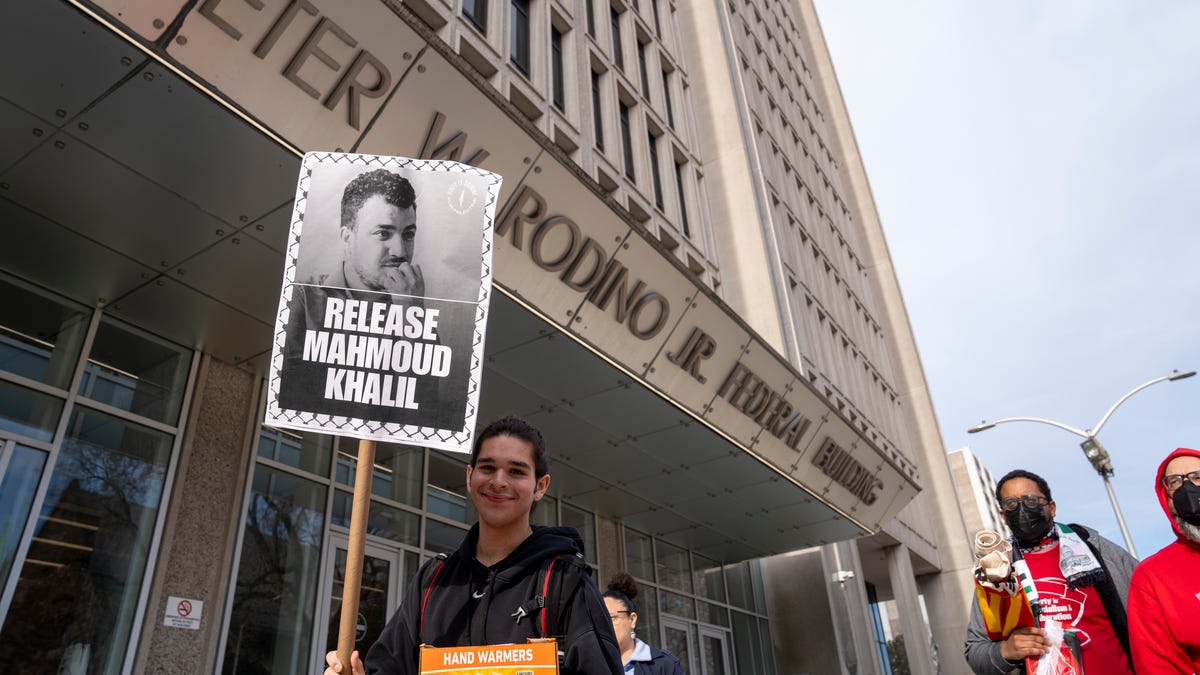New video footage shows moments leading to arrest of Columbia student activist Mahmoud Khalil
New video footage shows the moments before Columbia student activist Mahmoud Khalil was arrested by U.S. Immigration and Customs Enforcement agents on March 8.
Courtesy of NYCLU
- Immigration agents arrested Khalil, a green card holder married to an American citizen, on March 8 in the lobby of his student apartment building in Manhattan.
- The Department of Homeland Security is trying to deport Khalil, arguing that his pro-Palestinian activism threatens U.S. foreign policy interests.
- He remains in a detention facility in Louisiana and is scheduled to appear in an immigration court there on May 22.
Columbia University acting President Claire Shipman faced loud booing and chants of “Free Mahmoud” at a commencement ceremony on May 20, bringing her speech to a standstill as students expressed outrage over the continued detention of their peer.
The scene, captured in posts shared across social media, shows students from Columbia College, an undergraduate school for liberal arts, interrupting Shipman’s speech as they called for student activist Mahmoud Khalil to be released. Others can be heard yelling, “You arrested us,” alluding to the university calling in police to break up student protests.
Immigration agents arrested Khalil, a green card holder married to an American citizen, on March 8 in the lobby of his student apartment building in Manhattan. The Department of Homeland Security is trying to deport Khalil, arguing that his pro-Palestinian activism threatens U.S. foreign policy interests.
He remains in a detention facility in Louisiana and is scheduled to appear in an immigration court there on May 22.
Video of ‘illegal’ arrest
Assistant Chief Immigration Judge Jamee Comans ruled on April 11 that the Trump administration can move forward with efforts to deport Khalil.
Khalil’s attorneys said they have filed a renewed request with the judge to drop the U.S. government’s case, citing new video evidence they say shows that his arrest was illegal.
U.S. Immigration and Customs Enforcement agents initially said they had a warrant in their arrest report, according to Khalil’s attorneys. Later, government lawyers acknowledged in a court filing that they did not have a warrant but argued that none was needed because of “exigent circumstances.” They wrote that Khalil was a “flight risk” and that “it was likely he would escape before they could obtain a warrant.”
The surveillance footage and previously released video contradicts that, Khalil’s legal team says. The video shows Khalil calmly talking to agents, cooperating and making no attempt to leave.
“The footage released today of Mahmoud Khalil’s arrest couldn’t be clearer — the Trump administration’s claims that Mr. Khalil resisted arrest are false,” said Amol Sinha, executive director at the ACLU of New Jersey. “His unlawful arrest is a result of deliberate targeting by the federal government in retaliation for his advocacy in support of Palestinian rights.”
The video was obtained through a subpoena sent to Columbia University. It supports previous statements and video footage taken by Khalil’s wife, Noor Abdalla.
Khalil also has a federal lawsuit pending before the U.S. District Court for the District of New Jersey that claims his detention violates his constitutional rights of free speech and due process. The case was filed in New Jersey because Khalil was detained there before his transfer to an immigration detention center in Louisiana.
U.S. case against Mahmoud Khalil
A Palestinian who was born and raised in Syria, Khalil has not been accused of any crime. Secretary of State Marco Rubio argued in a letter to the court, submitted as evidence, that he has the authority to deport noncitizens who harm foreign policy interests even if their beliefs, statements or associations are “otherwise lawful.”
Rubio also alleged that Khalil participated in “antisemitic protests and disruptive activities” that “undermine U.S. efforts to combat anti-Semitism.”
Khalil was a student negotiator and spokesman for protesters at Columbia in the spring of 2024, when protests against war in Gaza gripped college campuses. He and his lawyers have disputed allegations of antisemitism. They argue that the Trump administration is attempting to silence criticism of Israel and falsely conflating pro-Palestinian activism with antisemitism. Jewish students at Columbia have also written letters to the court saying Khalil had supported them and defended them.
Missing graduation
Khalil’s case was the first of several high-profile incidents in which pro-Palestinian student activists were detained by immigration authorities and targeted for deportation.
Federal judges have freed several of the students on bail, including fellow Columbia activist Mohsen Mahdawi, who was detained by ICE during a citizenship interview in April. Mahdawi graduated on May 19 receiving a standing ovation as he donned a keffiyeh and flashed peace signs to the crowd.
Khalil, who missed the birth of his first child last month, will also miss his commencement ceremony at Columbia on May 21. He completed his master’s degree from the School of International and Public Affairs in December.
On May 18, Abdalla, his wife, accepted a diploma on his behalf in an alternative “People’s Graduation” ceremony, holding their son, Deen. The ceremony was organized by the People’s University for Palestine, a coalition of student organizations advocating for Palestinian rights.
Abdalla read out a message from Khalil. “Thank you for holding me in your hearts today. It has been two months since I was taken from my family and from you, detained simply for speaking the truth about Palestine,” she read from the statement.
“Columbia University, the place where we sought knowledge, justice, and truth, chose silence instead of solidarity. It failed me, but you didn’t. You showed up, you reminded me that while institutions may abandon us, the people never will.
“I’m endlessly proud to be among you, and I carry your love with me every day,” Abdalla read. “Please keep carrying mine.”
